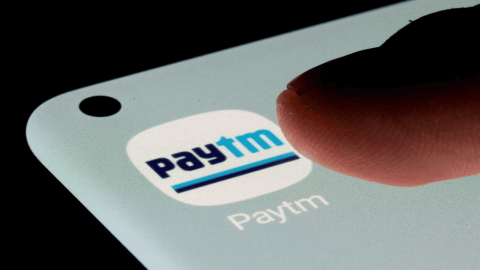PAYTM Share Price Jumps 5 Percent in Early Trades; Investors Leave CTO's Resignation Behind
PAYTM share price has been very volatile in the recent days and the stock has been facing higher volatility based on the news on the counter. Yesterday, the stock declined by over 6 percent as CTO resigned. Today, PAYTM is witnessing a rebound and trading 5 percent higher in early trades. The stock touched intraday high of Rs 685 at the time of publication of this report. The stock opened at Rs 657 but saw heavy buying from lower levels.
Currently, the company is not profitable, which is reflected in its negative Price-to-Earnings (P/E) ratio, and it is expected to break even by 2026. While there is cautious optimism, analysts have varied opinions regarding its short-term trajectory.
52-Week Performance
52-Week High: The stock hit its highest point in the last 52 weeks at Rs 998.30, showing a promising peak for long-term investors.
52-Week Low: On the downside, the stock plummeted to Rs 310.00, reflecting the challenges Paytm has faced, particularly in the competitive digital payments landscape.
The wide range between the yearly high and low underlines the stock's susceptibility to external market forces, sentiment-driven buying, and selling, and evolving company fundamentals.
Financial Ratios and Valuation Metrics
P/E Ratio: Paytm’s current Price-to-Earnings (P/E) ratio is negative, indicative of its unprofitability. The company has been posting consistent losses as it continues to invest heavily in growth and customer acquisition. Although revenues are improving, the operational expenses weigh on profitability.
This negative P/E ratio signals caution for investors seeking earnings-driven valuation metrics. However, for those willing to bet on future potential, the stock may hold promise once it starts generating profits.
Research Insights and Analyst Recommendations
Analyst Ratings: Several research houses have issued varying recommendations for Paytm. As of the latest reports, Ventura Securities has maintained a BUY rating on the stock with a target price of Rs 830, which implies a moderate upside from current levels. This report was issued on September 25, 2024, suggesting that analysts believe Paytm's long-term business model will eventually drive shareholder value, despite the ongoing losses.
Conversely, some analysts have issued more cautious or SELL ratings, citing concerns over profitability timelines and competition in the digital payments space. The road to breaking even has been consistently delayed, with current estimates pushing Paytm’s profitability to 2026.
As reported earlier by TopNews, PAYTM is taking a few steps to improve its consumer payments business.....
Reinvestment in Consumer Payments as a Strategic Priority
In response to these challenges, Paytm’s top priority is to reinvest in its consumer payments business. Speaking at an event hosted by the Calcutta Chapter of Young Indians, CEO Vijay Shekhar Sharma emphasized that while Paytm’s merchant services have continued to perform strongly, the loss of consumer users needs to be addressed. Sharma expressed the company's commitment to rebuilding the consumer payments segment, which includes services like Unified Payments Interface (UPI) transactions, in order to regain its lost footing in the market.
Sale of Non-Core Assets to Sharpen Focus
In a bid to concentrate on its primary operations—payments and financial services—Paytm divested its ticketing business to food delivery giant Zomato for Rs 2,048 crore in August. This strategic sale allows the company to channel its resources more effectively into strengthening its core offerings. By shedding non-essential operations, Paytm is refining its business strategy to prioritize consumer payments and financial services distribution.
To enhance its consumer offerings, Paytm is increasingly focusing on the Third-Party Application Provider (TPAP) model. TPAPs allow companies to offer digital payment services through partnerships with banks and financial institutions.
